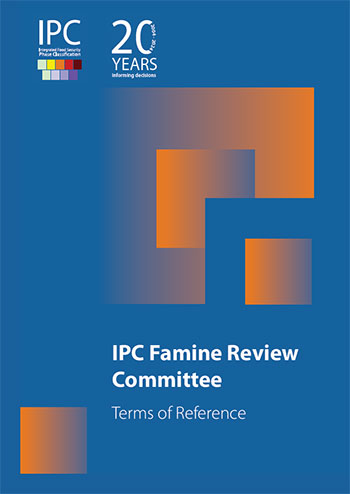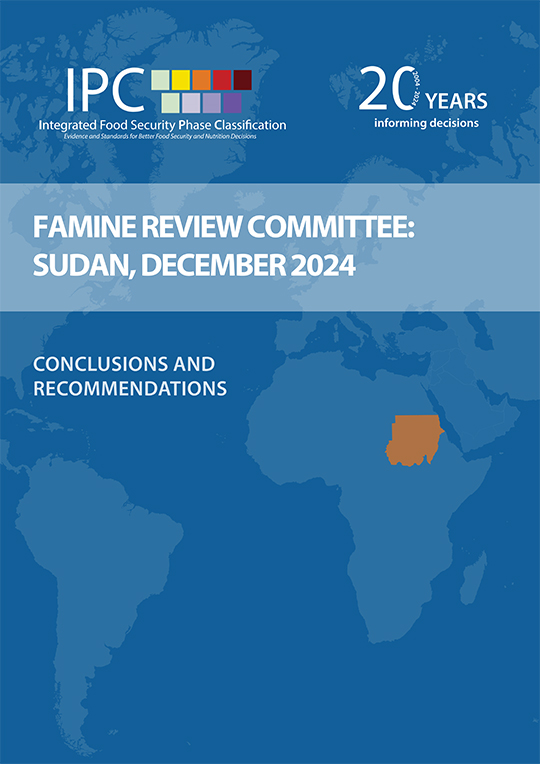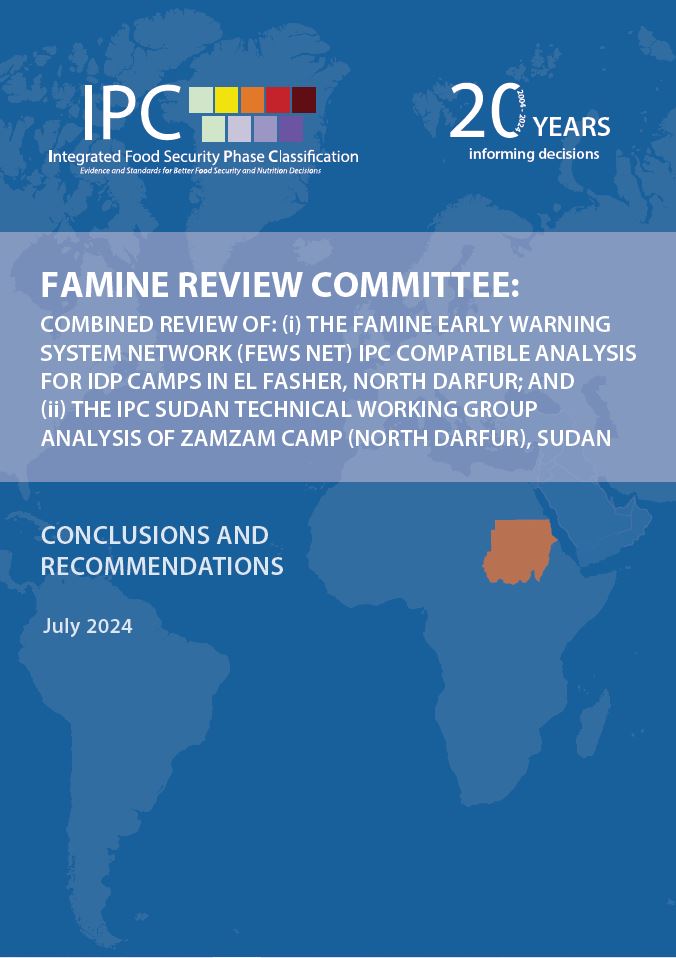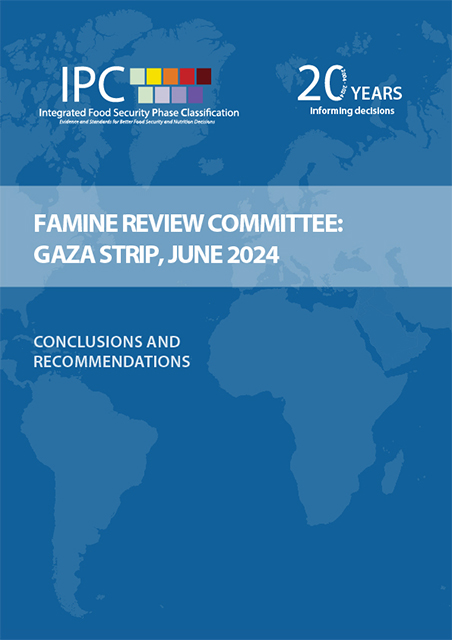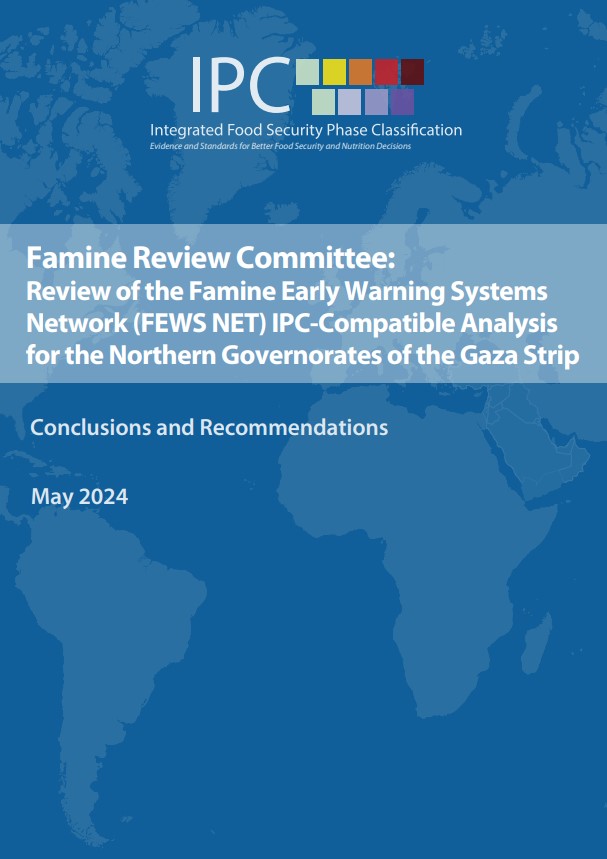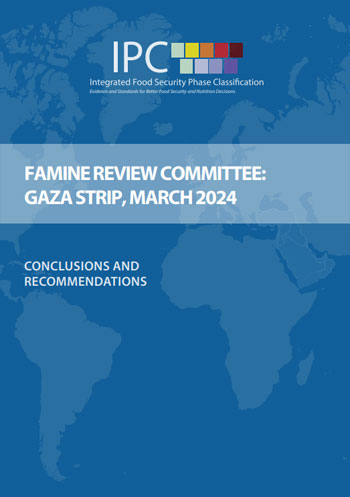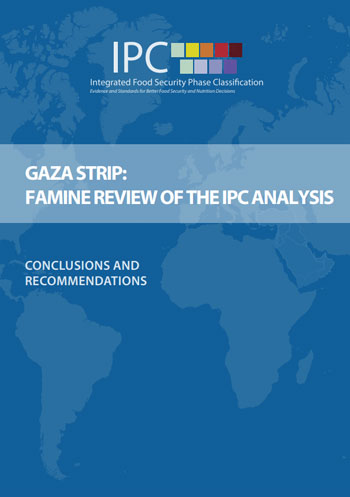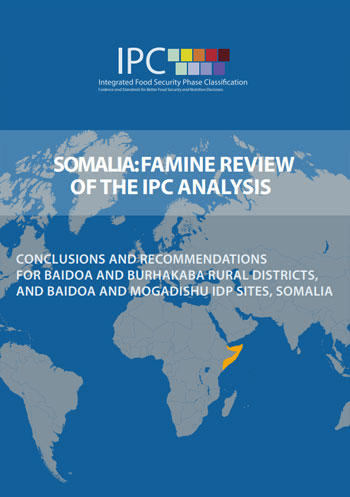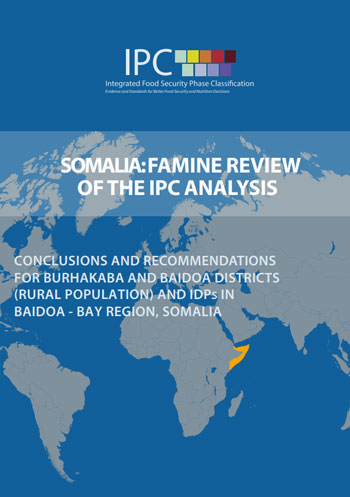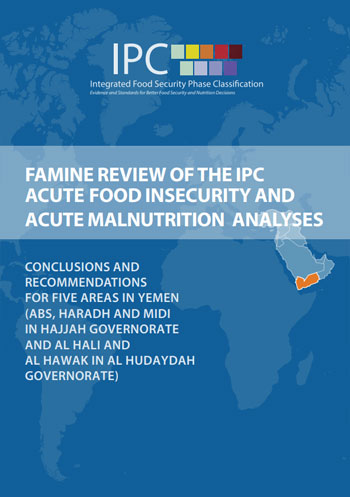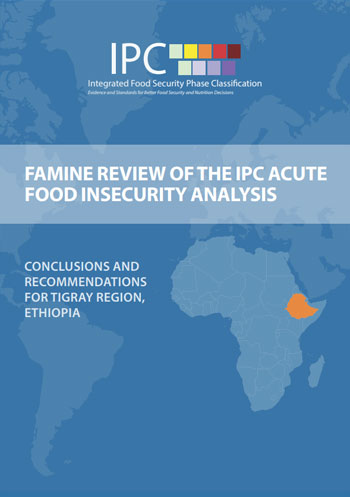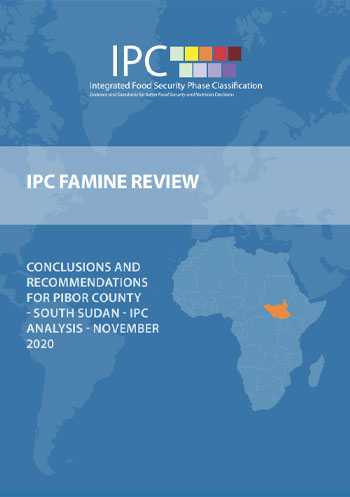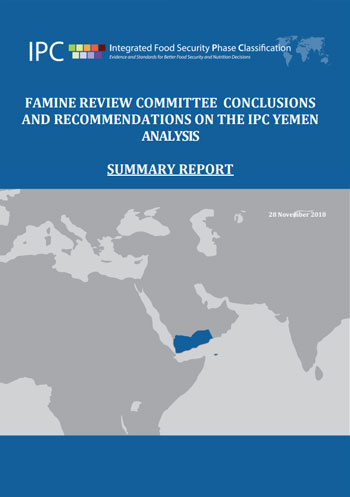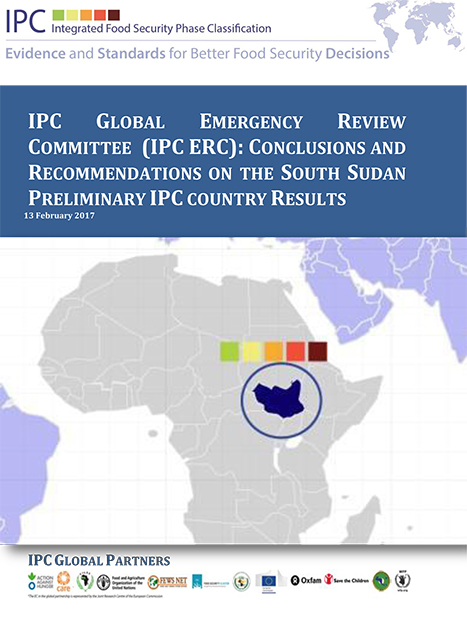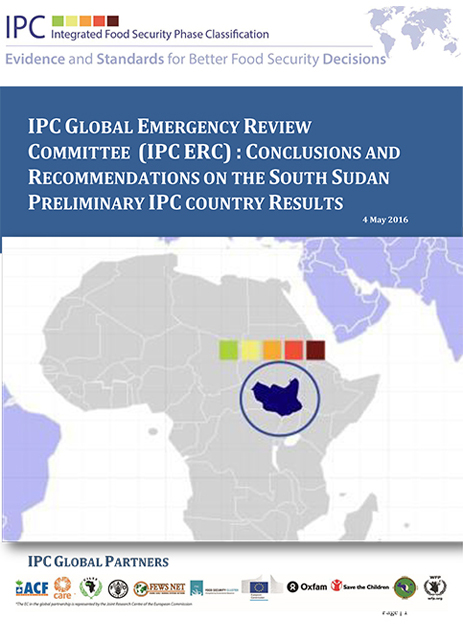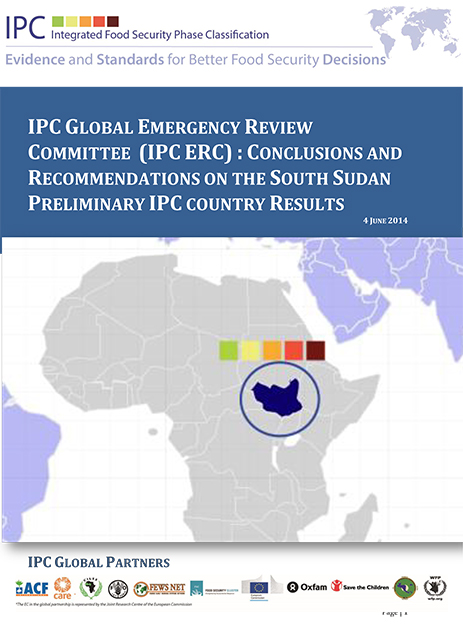Famine Review Committee
About the Famine Review Committee (FRC)
The FRC is an ad hoc specialized committee consisting of a panel of international technical experts in the areas of food security, livelihoods, nutrition and health. The committee is activated by the IPC Global Support Unit (GSU) when there is a need to independently review IPC analysis findings to support quality assurance and technical consensus building in situations when there is a potential or already identified IPC Famine classification or a breakdown in consensus regarding a potential IPC Famine classification. The FRC provides recommendations to the IPC country Technical Working Group (TWG) or analysis team, and the IPC GSU serves as the chair, secretariat and provides coordination support to the FRC.
The FRC was established in 2014 and was originally called the Emergency Review Committee (ERC). Since its inception, the FRC has conducted Famine Reviews in various contexts, including for Ethiopia, the Gaza Strip, Somalia, South Sudan, Sudan and Yemen.
Purpose
The FRC is activated to review Famine classifications when IPC country analyses show potential or already identified Famine. The purpose of the FRC is to:
- Provide independent and neutral expert technical guidance to the country IPC TWG/analysis team on their IPC analysis results.
- Serve as an additional quality assurance step to help ensure technical rigour and neutrality of IPC results related to Famine classifications.
- Support the technical consensus-building process on the IPC analysis results in case of disagreement within the TWG/analysis team.
- Enhance the credibility of the IPC process and outcomes.
Download the IPC Famine Review Committee Terms of Reference
FRC Reports
Meet the Famine Review Committee Members
Dr. Oleg Bilukha

Dr. Oleg Bilukha, MD, PhD, is a nutrition and health expert on the FRC and has been a member since 2014. He holds an adjunct professorship appointment at the Emory University Rollins School of Public Health. Until 2025, Dr. Bilukha served as the Associate Director for Science for the Global Public Health Emergency Branch, Global Health Center, in the United States Centers for Disease Control and Prevention (CDC). Dr. Bilukha is a globally recognized expert in public health, epidemiologic methods and nutrition among other areas, and has over 20 years of experience working in major humanitarian emergencies. He pioneered the Standardized Monitoring and Assessment of Relief and Transitions (SMART) methodology, which provides a technically sound, yet rapid approach to the measurement of acute malnutrition among children 6-59 months and mortality in emergency settings. Dr. Bilukha published over 70 peer reviewed manuscripts, and reviewed for over 20 major scientific journals, including Lancet and BMJ. He holds a Doctorate of Medicine (MD) from Ukraine, a PhD in Nutrition Sciences from Cornell University, and completed an Epidemic Intelligence Service Fellowship at CDC.
https://www.cdc.gov/eis/php/our-work/whats-next.html
https://sph.emory.edu/faculty/profile/index.php?FID=oleg-bilukha-422
Dr. Nicholas Haan

Dr. Nicholas Haan is a global food security expert on the FRC and a member since 2014. Dr. Haan's expertise is also in the areas of technology, innovation, multi-sectoral humanitarian assistance, climate change, energy, education, genetics, and information systems. Dr. Haan created the Integrated Food Security Phase Classification (IPC) in 2004 while serving as the FAO Chief Technical Advisor for the FSAU. He currently is a Senior Advisor for the IPC Global Support Unit and serves as Co-Chair of the Advanced Technology and Artificial Intelligence Working Group. Dr. Haan has been a faculty member at Singularity University since 2012, serving in various leadership roles including as Vice President for Impact, Faculty Chair of Global Grand Challenges, and Managing Director for the Global Startup Program. Dr. Haan is the Chairperson of the Government of Zanzibar Digital Economy Advisory Council and has been living in East Africa for over 30 years. Educationally, Dr. Haan holds a Ph.D. (Geography), two Master's (Development Economics and International Development and Geographic Information Science) from Clark University; and a Bachelor of Science (Genetics) from the University of California, Berkeley.
Peter Hailey

Peter Hailey has over three decades of extensive international expertise as a nutrition specialist, steering large-scale nutrition initiatives in complex emergencies for the UN and INGOs. Peter is an expert in nutrition information systems within these emergency contexts. Following his role as manager of the UNICEF Somalia nutrition and social protection response to the 2010/2011 famine, Peter became a member of the inaugural Famine Review Committee in 2014, a position he continues to hold. Collaborating with a colleague, he initiated the Centre for Humanitarian Change (CHC) in Kenya in 2014, dedicated to addressing new approaches to humanitarian work in the fragile and conflict affected regions of East Africa and beyond. Peter has published research on nutrition information systems during emergencies, delved into the complexities of the 2010/11 famine in Somalia and the politics related to information systems in emergencies, and offered insights on broader famine issues. Moreover, his publications encompass diverse topics including Health Systems Resilience, surge approaches, localization and marginalization, as well as corruption and diversion.
https://fic.tufts.edu/team/peter-hailey-2/
https://whatworks.co.ke/about-us/
Dr. Daniel Maxwell

Dr. Daniel Maxwell is a food security expert on the FRC and has been a member since 2014. He is the Henry J. Leir Professor in Food Security at the Friedman School of Nutrition and Research Director at the Feinstein International Center at Tufts University. Prior to joining the faculty at Tufts, Dr. Maxwell worked for two decades for humanitarian agencies, primarily in Africa. His most recent position was Deputy Regional Director for Eastern and Central Africa for CARE International. He holds a PhD from the University of Wisconsin, a master’s degree from Cornell University, and a Bachelor of Science from Wilmington College.
Dr. Andrew Seal

Dr. Andrew Seal is a public health and mortality expert on the FRC and has been a member since 2020. He is an Associate Professor in International Nutrition at University College London (UCL) and works on nutrition and public health in populations affected by humanitarian emergencies. Dr. Seal co-leads the Centre for Climate Change, Migration, Conflict, and Health at UCL. He holds a PhD from the University of Birmingham, a Master of Science from the London School of Hygiene and Tropical Medicine, and a Bachelor of Science from Aston University.
Call for Expression of Interest
The Famine Review Committee is looking to expand its membership to promote greater thematic, gender, geographic, and linguistic diversity.
For detailed information on the vacancy and the application process, please refer to the Expression of Interest page.
The IPC Global Support Unit welcomes applications from interested individuals.
Other Resources
IPC Technical Manual 3.1
The Famine Guidance Note
The risk of Famine Guidance Note
The IPC Famine Fact Sheet
IPC Communication Guidelines
Frequently Asked Questions
When is the FRC activated?
When a country's IPC analysis identifies a potential or already identified situation of Famine, a specific procedure is initiated to review the Famine classification. Famine Reviews are conducted by the FRC and can be triggered in several ways:
- The country IPC Technical Working Group (TWG) or analysis team concludes that at least one area is classified in IPC AFI Phase 5 (Famine) classification
- There is a breakdown in technical consensus within the TWG/analysis team regarding possible IPC AFI Phase 5 (Famine) classification
- The IPC GSU is aware of evidence indicating the possibility of IPC AFI Phase 5 and chooses to activate the FRC
- An IPC Global Partner officially requests the IPC GSU to activate it due to concerns about whether an area is in IPC Phase 5 (Famine)
Famine Reviews are mandatory for both IPC products and IPC-compatible products and are to be conducted before the analysis team releases findings.
How is the Famine Review conducted?
A Famine review is mandatory for any Famine classification and involves two key activities:
- Famine Review Preparation: The Famine Review preparation is led by the Global Support Unit with inputs from global experts who have not been involved in the IPC analysis. This review consists of a preliminary screening of the Famine classification to verify adherence to IPC protocols, preparing evidence summaries, and providing the Famine Review Committee with general recommendations.
- Review by the FRC: The FRC reviews available documentation and evidence to determine if a Famine review is feasible, considering the availability and adequacy of data, as well as the apparent level of severity. The FRC’s role is to reach a conclusion on the plausibility of Famine classification. In cases where the evidence does not meet the minimum requirements for a Famine classification, expert judgment may be used to make a determination.
The conclusions and recommendations of the FRC are communicated by the IPC GSU to the members of the Technical Working Group (TWG) or analysis team and shared with the IPC Global Steering Committee. The FRC report is made publicly available on the IPC website along with the IPC TWG/analysis team report.
There is no fixed duration for a Famine review, as it varies depending on the size and complexity of the areas under review, the availability of data, and other factors. However, the process typically takes two to three weeks, which includes preparation and the FRC’s review and presentation of their findings.
How does the FRC reach consensus?
Like any IPC analysis, the FRC operates on a consensus basis as outlined in IPC Manual 3.1. The FRC strives to reach consensus among its members in all Famine reviews. However, consensus does not necessarily mean unanimity, and disagreements may arise. Any disagreements among FRC members on the final conclusions are noted and communicated in the FRC reports when necessary.
How does one become an FRC Member?
Call for Expression of Interest
The Famine Review Committee is looking to expand its membership to promote greater thematic, gender, geographic, and linguistic diversity.
For detailed information on the application process, please refer to the following page: Call of expression of interest
The IPC Global Support Unit encourages qualified and interested individuals to apply.
Join our mailing list

